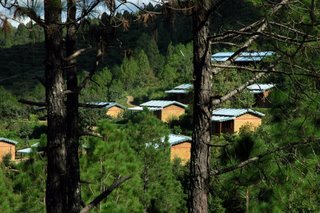

The Hindu, April 16th 2006
For a touch of heaven on earth this summer, head to Sonapani. While many popular hill stations have come to be synonymous with traffic, pollution, and crowds – in short, all that the wary city dweller attempts to take a break from – Sonapani, with its rare combination of rustic charm and pristine natural beauty, is a welcome respite. Nestled in a forested grove and offering a stunning view of the Himalayan ranges, Sonapani is paradise for the senses and for the spirit.
Sonapani is a two hour drive from the nearest railhead of Kathgodam, which is an overnight journey from
Creating the resort at Sonapani wasn’t easy, however, explains Ashish. “The house and estate were in shambles when I first came, but I fell in love with the place and so I built it up with my own hands.” Ashish had come to Sonapani from Delhi, where he wanted to throw off the ‘suit and tie’ mania of the corporate world. Having been born and brought up in Kathgodam, he yearned to return to the hills and begin a project that would connect city-people to the natural beauty of the mountains, and also create a source of local employment for people in the area. “For want of employment, pahadi folk are often forced to migrate to the cities, where many end up in urban slums. Imagine having to give up this,” he says, his hands sweeping across the magnificent landscape in front of us, “for life in a slum!”
As my eye catches the iridescent sheen of a tiny hummingbird, the truth of Ashish’s words hit squarely home. The sheer abundance around me is so astonishing that it seems as if the word ‘want’ would simply not exist in the vocabulary here. Energetic wildlife – the busiest creatures on the estate – buzz, fly, sing and perch around us. Hundreds of species of birds call Sonapani home; magpies, bulbuls, and woodpeckers are just a few of its frequent visitors. Butterflies of striking design and color emerge in regular intervals to brighten the azure sky. Fruit trees abound; in front of every cottage, says Ashish, are fruit trees that are “opportunely located so that our guests can pluck fruit from them and eat them from the comfort of their cottages!” Vegetables – most grown organically - are located in neat patches between the cottages, where they find their way to the delicacies stirred up in the kitchen.
Indeed, if there were just one reason to visit Sonapani, it may be for the food. Despite being a self-proclaimed non-food aficionado, I found myself eagerly looking forward to the three mouth-watering meals -- and everything in between. The recipes are of traditional north Indian style, with the key difference from plains-food being the organic, fresh and local ingredients used. Herbs, such as rosemary, sage and thyme are grown on the estate and incorporated into the meals; garlic, being a commonly used ingredient in pahadi cooking is often used for light flavoring. Home-made fruit jams and chutneys, preservative-free and rich with local flavor, have become a Sonapani specialty. Just as I was about to ask if I could purchase a bottle of the maddeningly delicious apricot chutney, Ashish informed me that though they do not sell products now, they hope to begin an environmentally-friendly agribusiness in the future in a further effort to bolster the local economy.
The most memorable part of my visit to Sonapani was the incredible warmth of its people. Ill-prepared for a nippy evening, Ashish’s wife Deepa promptly offered me one of her sweaters. “We want our guests to feel at home,” she explained. So visit Sonapani and revel in its splendor - but beware, you may never feel like returning home. For more information on Sonapani, contact Ashish at: 9719005900 or access www.himalayanvillage.com
No comments:
Post a Comment